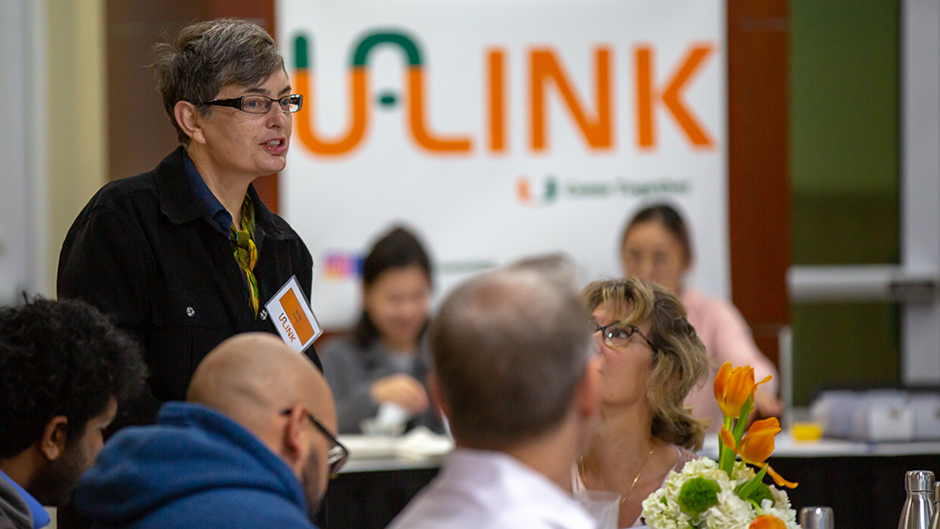If you were accidentally beamed back to the Salem witch trials, how would you explain to 17thcentury minds the smart phone you’re about to pluck from your pocket to summon your means of escape?
Sharing their answers with each other at the University of Miami Laboratory for Integrative Knowledge’s, or U-LINK’s, second Team Science Workshop that began Thursday, sculptor Billie Lynn and engineer Prannoy Suraneni provided a small glimpse into how differently experts from different disciplines communicate.
“Even if you don’t shout really loudly, this is something that through the power of God allows people very far away to hear you,” Suraneni, assistant professor in the Department of Civil, Architectural and Environmental Engineering, told Lynn.
Lynn’s response? “I’ve been sent here by a group of angels and this is my device for reaching them through prayer,” the associate professor of sculpture quickly invented.
Led by Ali Mosser, U-LINK’s senior manager for research support, the cell phone exercise was a fun way to convey one of the most important lessons of the two-day workshop aimed at teaching the difficult art of team science: Building effective interdisciplinary teams depends on effective communication, which often means developing a shared language everyone can understand.
“Teams need to recognize that every discipline has its own language and its own jargon that may not be understood outside the discipline,” Mosser said.
A key initiative of the University’s Roadmap to Our New Century, U-LINK was launched two years ago to encourage the development of multidisciplinary research projects that have the potential to address critical and complex societal problems—and the ability to attract the external funding needed to advance their proposals to viable solutions. It just awarded its second round of Phase I grants of $40,000 to six teams that will examine ways to reduce opportunity gaps and biases in different realms and improve brain injury treatments and resident-friendly coastal protections.
Describing himself as a researcher whose “whole life has been dedicated to getting the federal government to give me money,” John Bixby, vice provost for research and U-LINK’s director, said the pros of conducting team research far outweigh the cons, which he said include the potential for increased misunderstanding, slower productivity, and uneven contributions from team members. But, calling team science a trend and U-LINK’s growing group of grantees “part of a vanguard,” he assured them the journey ahead would be rewarding.
“It’s just more fun to work with a bunch of different people, a bunch of smart people, who know things that you don’t know,” he said.
The new Phase I winners were joined at the workshop by members of three of the inaugural Phase 1 teams that were selected to receive Phase II funding of $150,000. Each team also includes a UM librarian, which, like the workshop, makes U-LINK unusual, according to U-LINK co-director Susan Morgan, associate provost for research.
“A lot of teams are dedicated to your success, which indicates how much we want you to succeed,” Morgan said.
Lynn and Suraneni, who are both members of the team that is looking at the next generation of coastal protections, said they are already enthralled by the process of team building outside their comfort zones.
“It’s fascinating because in the arts we are accustomed to working alone,” Lynn said. “You’re supposed to be a single author, a famous genius artist. So it’s rare to be part of a collaborative team where authorship is going to be shared and art is going to be respected as a part, a natural part, of the sciences.”
“I’m really loving the whole thing,” Suraneni said.
Open only to U-LINK grantees, the workshop continues on Friday, starting with a keynote address by Anita Woolley, an expert in organizational behavior from the Tepper School of Busiess at Carnegie Mellon University.

